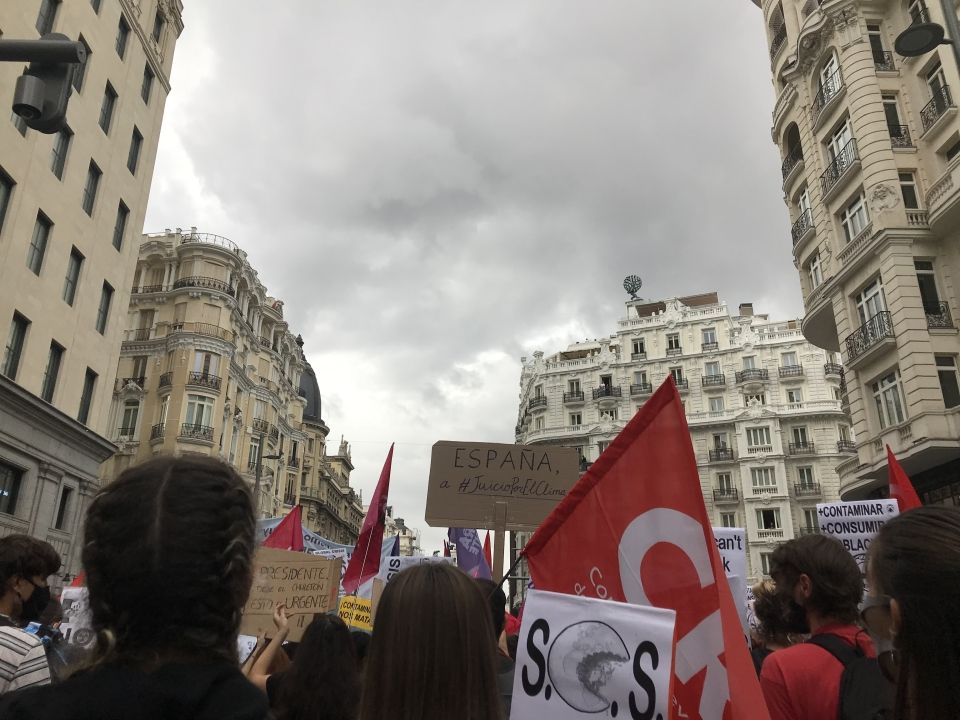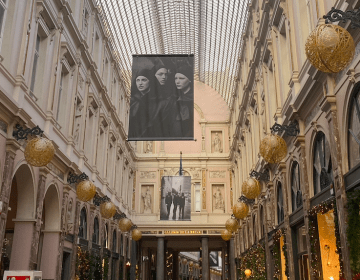"La lucha es el único camino,": Attending a Protest in Madrid
On Friday, September 24th, I and a few other CIEE participants took part in the Global Day of Climate Action, an event of over 1500 protests worldwide organized by the youth movement Fridays for Future. The majority of the participants were youth–people my age and younger–but the march attracted participants of all ages, backgrounds, and abilities.
— Fridays For Future Madrid (@FridayForMadrid) September 24, 2021
El clima está de nuestra parte, no nos va a llover.
Si te lo sigues pensando estamos en la calle Hortaleza exigiendo un #JuicioPorElClima histórico. pic.twitter.com/SErpsl3VfY— Fridays For Future Madrid (@FridayForMadrid) September 24, 2021
We who attended walked for about three hours through the streets of central Madrid, holding simple signs made by a youth organization, listening to the drum corps and taking in the scenes of the manifestación.

My favourite part of the experience was the chants, which despite having similar meanings to those found at english-language protests, struck me as more significant in the moment. Something about the linguistic or cultural meaning and formation of the slogans shouted out by the young organizers with megaphones just felt particularly exciting. Some of the ones that I remembered are:
- “Sin planeta, no hay futuro,” (without a planet, there is no future),
- “Menos polución, ¡viva revolución!” (less pollution, long live the revolution),
- “Sistema culpable, gobierno responsable,” (System at fault, government responsible).
In Spain specifically, protests focused on a year-long legal battle in the supreme court that would hold the government to further its commitment to cutting emissions. And in Madrid, thousands came out to the Plaza de Callao, in the middle of the city, to march for climate justice.

Perhaps my biggest takeaway from this experience, besides the slogans, is that protests are fairly common in Madrid, and accepted as a simple part of life in the city. This was striking to me, coming from the United States–despite our protest-filled founding history, protests today only happen in a kind of ultimate, last-ditch effort by people to express frustration about societal issues that have reached an utter fever pitch. And if there is a protest, it’s not really a sanctioned event with government or local authorities–often, the opposite. However, in Madrid, occurrences that block off a few major roads are less of inconveniences, and more simply, bound to happen. In fact, it’s expected (and required) that if a manifestación is organized, it is reported to the local police. Law enforcement then creates the parade route, directs traffic, and essentially makes sure that everything runs smoothly. For someone coming from the United States, this is in definite and direct contrast to my cultural understanding of protesting, in which the role of law enforcement is to prevent, disrupt and disband demonstrations, regardless of whether they are peaceful or riotous. So, the different role of law enforcement at protests was to me slightly nerve-wracking, and too, a bit comforting (which was…new, to say the least). I knew I was protected while participating in the protest, which, even for an issue as seemingly pacifistic as climate justice, was still nice to feel.
But, to drive home just how common protests are in Madrid, not even a week before the Global Day of Climate Action, workers of the state lottery had their own which shut down Calle de Atocha, a major road through the capital. From time to time, there are also demonstrations for decolonization and indigenous acknowledgement, women’s rights, the awareness of mistreatment of animals, international affairs, regional pride and autonomy of parts of Spain, and of course, the ever-common train strikes among other issues.
The downside of the normalization of protests is that hate groups also take advantage. Recently, neo-nazi groups have conducted weekly demonstrations specifically in Chueca, Madrid’s historically LGBTQ+ neighborhood. Although it’s regrettable, they too are given the same opportunity to plan a route and have some kind of authority present to oversee that their event takes place. This however, does not mean that everyone is in accordance with their ideas–as in the case of any protest. In this case, many madrileños spoke out against these demonstrations on social media.
no voy a comentar nada al respecto por que igual entro a la cárcel directo #chueca #nazis pic.twitter.com/qXQE6mQwI0
— ian (@izanfddez) September 18, 2021
The protest came in tow of the recent death of a young gay man in Galicia, which sparked national conversations about the safety of LGBTQ+ individuals, and the ever-present issue of homophobia and hate crimes against marginalized groups. The LGBTQ+ community in Spain has been especially vocal for the past few months, and so with the appearance of very flagrantly far-right groups in the capital, they responded with their own counter-protests in turn.
This is all to say, Madrid, at Spain’s literal center, is most definitely an active forum for those who seek to express their social and political opinions. If you’re an activist and considering teaching abroad in Spain, you may feel more comfortable here than in the States, despite the change in environment and nation-specific issues, simply due to the acceptance of ideological diversity and exchange, and the commonplace nature of organized demonstrations. And if you don’t necessarily consider yourself a vocal individual when it comes to systemic or cultural issues, Spain might be the place to explore your sense of political and personal expression. However you feel, I think this chant is definitely applicable to anyone who wants to stand up for their beliefs:
"La Lucha es el único camino"; The only way is to fight.
Have you participated in a protest before? Let me know in the comments down below.
Related Posts
Self Intro!
A little bit about me :) I am from Sacramento CA, and I love basketball, history, writing, and hiking! I arrived on August 12th and had so fun and memorable experiences already! try to get out of your comfort zone and try new things in all aspects of life!!
Moving to Madrid, Spain from Tennessee
This will be one of a few blog posts that I make when I primarily talk about myself, I promise. Right now, I am less than a week away from... keep reading
48 Hours in Belgium
Because Madrid has a number of bank holidays, us language assistants benefit from days off of school which are in turn, great times to travel and explore different places for... keep reading



